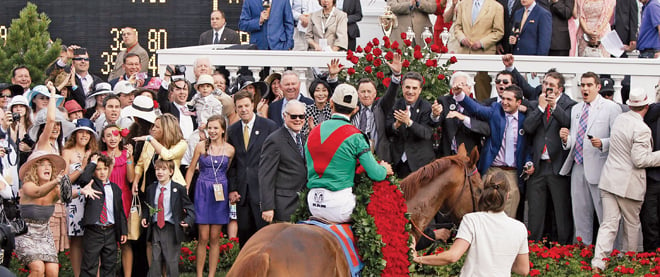Can’t afford to own a race horse? Buy a share of it.
Buying shares in horses opens a world once only accessible to sheiks and oil tycoons
Share

Ray Bouchard always loved horse races and for the past 37 years he’s watched his thoroughbreds run for small purses at Manitoba’s blue-collar raceway, Assiniboia Downs. But the farm equipment dealer from Winnipeg had every racing fan’s biggest dream come true when Animal Kingdom, a horse he part-owns, won the 2011 Kentucky Derby, which many consider “the most exciting two minutes in sport.” Along with the horse’s 19 other owners, Bouchard took home a piece of the US$2.1-million prize. “The experience of walking onto the infield of Churchill Downs and 170,000 people are cheering and looking at the winner’s circle and you’re sitting in it—it’s a surreal feeling,” recalls Bouchard. He is only the third Canadian to own a Derby winner.
Exactly how a Winnipeg tractor salesman found himself in such exalted company is the result of a fundamental shift in the world of international horse racing. A growing number of Wall Street-style investment partnerships have sprung up to allow investors to buy shares in horses and have a slice of a world once only accessible to sheiks and oil tycoons. It’s a booming industry that has attracted the likes of Canadian billionaire Frank Stronach. And while the investment stakes are high, for some horse racing enthusiasts, like Bouchard, the chance to own even a small share of a horse in the “run for the roses” in Kentucky is worth the risk.
There’s a reason it’s nicknamed the sport of kings: with training fees, vet bills, transportation and insurance, maintaining a racehorse adds up to roughly $40,000 a year. And that doesn’t include the horse’s purchase price. But the partnerships, which are set up like pooled investment funds for horses, are democratizing the sport similar to the way mutual funds brought stock investing to the masses. “It’s getting into the sport at the upper echelons in an affordable manner,” says Bouchard, who co-owns last year’s winner through an ownership syndicate called Team Valor International, which sells shares in some of its horses starting at $6,000.
When the gates open for the Derby on May 5, Team Valor hopes to show off the power of partnerships once again, this time with a horse named Went The Day Well. But the company isn’t the only partnership headed to the big race. Let’s Go Stable, a young syndicate run by brothers-in-law Kevin Scatuorchio and Bryan Sullivan, has a contender in a colt named El Padrino. Sullivan, 35, a former trader at Clinton Group, left Wall Street for the racetrack five years ago, and Scatuorchio’s father owned several champion horses. In 2010, the pair came up with the concept of the Derby Dreams Fund, raising $1.4 million from investors to buy six one-year-old, untrained horses with the pedigree and conformation (body type) to suit the gruelling 1¼-mile race. According to Let’s Go, packaging a group of unproven yearlings offers a better opportunity to discover the big horse with the potential to win. “They’re not all going to be great horses,” explains Scatuorchio. “This way it spreads the risk and makes a better opportunity to get excited. We were just hoping to get one great one out of the bunch.”
However, Team Valor runs differently. Instead of investing in a group of horses, each partner selects horses individually, building a bespoke stable. Since his original investment with Team Valor five years ago, Bouchard’s instincts have been good: he’s owned shares ranging from 2.5 per cent to five per cent in a number of the stable’s stars. He’s been to Dubai with a colt named Gitano Hernando who was later sold for a reported $4 million, according to the Daily Racing Form, and watched King of the Roxy tear up North America’s racetracks, amassing more than $600,000 in earnings. However, when asked whether he’s got a piece of Went The Day Well, the syndicate’s current Derby contender, he responded, “No, I passed on that one,” but is confident that he has “lots of irons in the fire” in other horses.
Partnerships are not a new concept in horse racing. South Carolina-based Dogwood Stables pioneered the idea of fractional ownership three decades ago. However, as the cost of breeding and owning race horses increases, and the farms that once dominated the sport have dwindled into obscurity, this new market has exploded.
Stronach, who stepped down as chairman of Magna International in March, jumped on the syndicate bandwagon earlier this year with the launch of six publicly traded racing corporations. Each will own 20 horses, with shares selling for $10 each. The companies are being marketed as a way to bring horse ownership to a wider field, though some critics have argued the way the partnerships are set up does little more than bolster Stronach’s own racing endeavours.
Regardless of how the risks are shared among investors, horse racing remains highly speculative. A warning in the regulatory filings for Stronach’s new companies says it all: “most racehorse ownership is not profitable.”
Just ask someone like Sheik Mohammed bin Rashid Al Maktoum, ruler of Dubai, and arguably the most influential figure in horse racing. He’s spared no expense in his attempts to win a Derby, spending $10.2 million in 1983 for a single horse. While Bouchard is one for one at the Derby, the billionaire sheik’s record remains zero for eight.